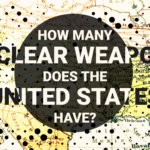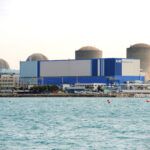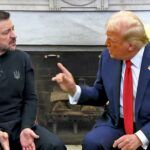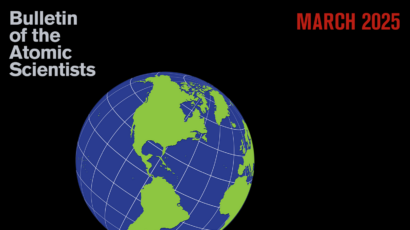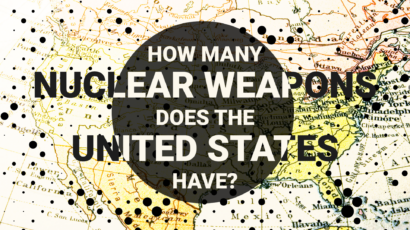The coming Middle East missile arms race
By Bilal Y. Saab | September 25, 2018
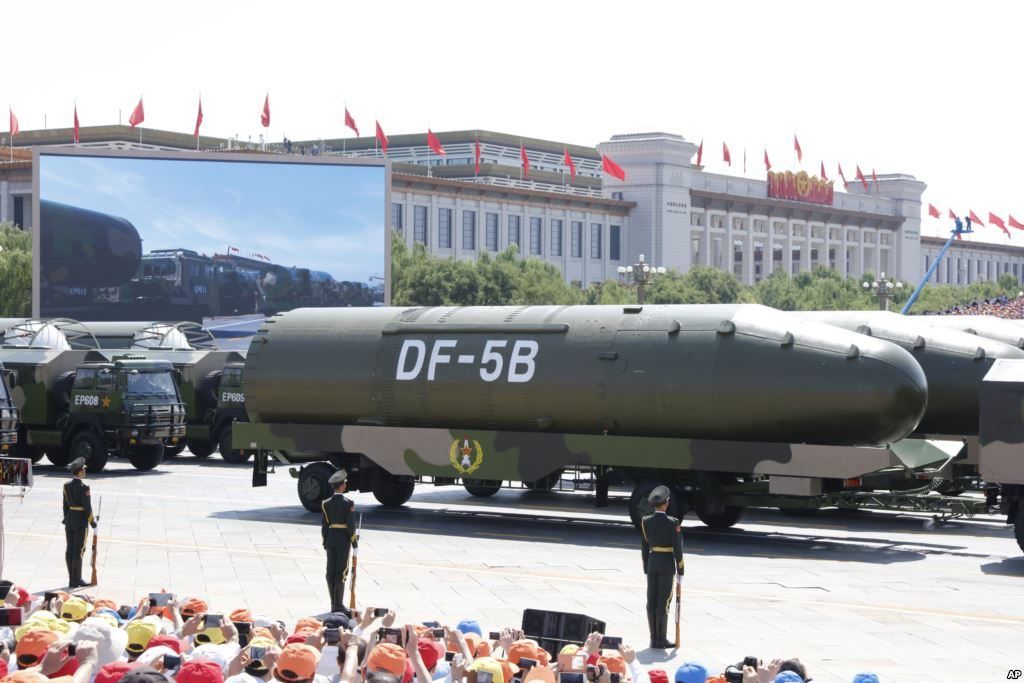 A Chinese intercontinental ballistic missile at a 2015 military parade in Beijing. China may be a source for other governments wishing to buy missiles. (Photo credit: Voice of America via Wikimedia Commons.)
A Chinese intercontinental ballistic missile at a 2015 military parade in Beijing. China may be a source for other governments wishing to buy missiles. (Photo credit: Voice of America via Wikimedia Commons.)
When pundits speak of a post-American Middle East, they are often referring to American fatigue in the region, coupled with Russia’s resurgence following its successful intervention and subsequent military expansion in Syria.
But the bigger story of the geopolitical transition underway in the Middle East is the rise of local powers, and how they increasingly operate outside the US strategic orbit due to their decreasing confidence in US leadership.
Saudi Arabia’s war in Yemen is one example. Traditionally a US partner, Riyadh has taken matters into its own hands, leading an intervention in Yemen’s civil war, because of its doubts about Washington’s involvement in the region.
But beyond Yemen, there is a broader trend of independent policy-making and action on the part of presumed US partners that underscores how the region has gradually moved away from America’s control. This trend is most evident in national defense strategy, and specifically the quest by some key US partners in the Middle East—for now, Israel, Saudi Arabia, and the United Arab Emirates—for greater offensive military capabilities in the form of longer-range and more precise ballistic missiles.
Last month, Israeli Defense Minister Avigdor Lieberman said in a statement that his country was investing in a beefed-up and more accurate rocket and missile force. “The project for setting up a precision rocket and missile system is underway. Part of it is already in production and part is in the final phases of research and development,” he said. “We are acquiring and developing precision fire systems that will allow … the Israel Defense Forces to cover within a few years every point in the region.”
This may not represent a major shift in Israeli defense doctrine, but it does suggest an important change in security planning, given the country’s habitual reliance on the air force, and sometimes the navy, for strike missions. If Israel’s leadership still believed strongly in America’s traditional security role in the region, it is unlikely to have moved so forcefully and rapidly in this direction.
Those who disagree with this conclusion might point to the fact that the IDF has planned to develop an offensive missile force for a few decades. Moreover, the move makes military sense regardless of US considerations. The Israeli Air Force has always carried most of the burden of national defense, so creating a more balanced defense posture might serve national security and save both lives and money. (Missiles are cheaper than fighter jets, and obviously eliminate the risk to pilots). At a time when Israel faces growing military threats that might force it to fight wars on multiple fronts—Syrian, Lebanese, Palestinian, and possibly Iranian—the IDF could certainly use greater operational flexibility and speed.
While that is all true, though, there is no question that America’s passivity in the Middle East in recent years accelerated this Israeli decision and turned it from idea into reality. Had Washington made tangible efforts to prevent Iran from establishing a long-term military presence in Syria, or had Israel had the slightest assurance that Washington would actively support the elimination of Iran’s military infrastructure in Syria, the IDF would probably have shelved the offensive missile option for some time.
Similar dynamics are occurring on the Arabian Peninsula. While America’s Gulf partners have not yet taken steps as bold and decisive as Israel’s, this is not for lack of desire. Conversations I have had with Gulf military leaders in recent years suggest a consensus view that attempts to deter Iran from further developing its missile capabilities have failed, and that they therefore need a more diversified force mix. Countries like Saudi Arabia and the United Arab Emirates were purchasing the best, US-made weapons on the planet and investing in the most sophisticated missile defenses, and yet they still felt they had no effective solution to Iran’s formidable and fast-developing offensive missile arsenal. Their conclusion was that they might have to fight fire with fire.
The main reason Riyadh and Abu Dhabi have yet to pursue ballistic missiles is that Washington has managed for years to convince them not to. The last thing the United States needs in the Middle East is an offensive missile race, which could quickly lead the antagonists into a deadly military confrontation that drags Washington and Moscow into war. Missiles are inherently destabilizing weapons because of their potential to quickly escalate conflicts. Their flight times can be very short, and new technologies are dramatically improving their accuracy and lethality.
As if that were not scary enough, the nuclear future of the Middle East is also increasingly uncertain, now that the United States has withdrawn from the Joint Comprehensive Plan of Action, the deal that limited Iran’s nuclear development in exchange for sanctions relief. At the same time, at least half a dozen regional powers including Saudi Arabia, the United Arab Emirates, Turkey, Egypt, Jordan, and Qatar see peaceful nuclear energy as a long-term solution to their fossil-fuel dependence. The growth of nuclear power generation in the region could exacerbate the risk of nuclear proliferation, as the same technologies and materials are required to develop both nuclear energy and nuclear weapons. Should Middle East civilian nuclear development become militarized, possession of fleets of offensive missiles—arguably the most effective delivery vehicle for nuclear warheads—could magnify the potential danger.
Like Israel, some Gulf countries are heading toward a stronger deterrent posture—through a broader mix of offensive technologies, including missiles—because missile defense on its own does not seem to be the answer to the Iranian missile problem. Furthermore, missile defense is expensive and comes with its own set of challenges. While the best missile defense system would be one that is regionally integrated, any hope of establishing such a system in the Gulf is now gone because of the ongoing feud Saudi Arabia, the Emirates, and Bahrain are having with Qatar.
With US influence in the Gulf seemingly declining, it is unlikely that Washington’s preferences will register as strongly in Riyadh and Abu Dhabi as they did in the past. To be sure, the drive for autonomy in national-security decision making has its limits, given the Gulf countries’ military dependence on Washington, but US weapons are not the only game in town, with both Russia and China making inroads into the region lately.
Saudi Arabia and the Emirates may not be able to buy offensive missiles from the United States and other countries that are members of the Missile Technology Control Regime, but they will find China and Pakistan—who are not part of the regime—to be ready sellers. Saudi Arabia would not have to start from scratch, given that since 1987 it has possessed a (likely small) number of medium-range Chinese ballistic missiles. It paraded them for the first time in 2014, possibly to put Iran on notice and send a message to Washington of displeasure with US policy. It is only a matter of time before Saudi Crown Prince and Defense Minister Mohammed Bin Salman issues an order to build up the country’s Strategic Rocket Force.
America has long wished that its partners in the Middle East would step up and share the burden of regional security. But for this approach to end well, one crucial variable is required: American leadership, which currently is uncertain at best and nonexistent at worst. The Middle East is headed into an offensive missile race, and the only actor that can stop or at least manage the situation, by promoting arms control, is the United States. Unfortunately it appears that Washington said goodbye to the region a while ago.
Together, we make the world safer.
The Bulletin elevates expert voices above the noise. But as an independent nonprofit organization, our operations depend on the support of readers like you. Help us continue to deliver quality journalism that holds leaders accountable. Your support of our work at any level is important. In return, we promise our coverage will be understandable, influential, vigilant, solution-oriented, and fair-minded. Together we can make a difference.
Topics: Nuclear Risk, Opinion



